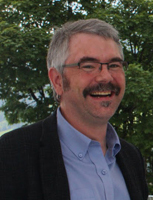
Dr. Howie Harshaw joins the faculty in 2013 from the University of British Columbia.
When a tree falls in the forest, Dr. Howie Harshaw likely knows who can hear it, what they think about it, and perhaps their social networking characteristics. According to Harshaw, exposure to nature - even sitting in a forest - can have beneficial health effects. "My research focuses on understanding the relationships that people have with nature. Outdoor recreation is the interface through which most people interact with, and experience nature. This provides some exciting opportunities for research."
By examining the human dimensions of natural resources, Harshaw's research also provides communities, municipal and provincial governments and industry a better understanding of public views and attitudes regarding operational and policy decisions. "My research focuses on understanding the interactions that people have with nature. Most people directly experience nature through participation in outdoor recreation activities; this participation can foster an understanding of nature. However, there are some people (e.g., shift workers, single parents) who have time constraints that limit their opportunities to engage in outdoor recreation activities."
With a real push for sustainable forest management certification in the 1990s, Harshaw was interested in understanding the relationships between resource development and extraction activities on the ground, and the perspectives of the public and public advisory groups. Moving forward, this line of research can shed light on how can we change the way that people see their surroundings." From this, Harshaw and his students assistants launched a research project on behalf of the nine sustainable forest management public advisory group, which had requested more information about the effects of forest management on people living in timber-dependent communities.
"The purpose of the British Columbia Sustainable Forest Management Public Opinion Survey was to inform Public Advisory Groups of stakeholder and constituency opinions and beliefs about sustainable forest management," said Harshaw. "This project reflects an attempt to realize continual improvement in the ways in which the Public Advisory Groups deliberate forest management issues, and to contribute to discussions about appropriate forest management practices in and near their communities."
Harshaw has helped to raise the profile of outdoor recreation concerns and issues regarding broader land-use planning initiatives and strategies. He has developed and assessed criteria and indicators used in outdoor recreation in the planning of resource-integrated forest landscape planning in British Columbia and the North American forest industry.
"Many of the outdoor recreation issues that I investigate have to do with coordinating public recreation use with natural resource development and use. For example, the BC Sustainable Forest Management Public Opinion Survey sought to characterize outdoor recreation use in each of the communities that were examined." Respondents of Harshaw's research were also asked whether they felt that their outdoor recreation needs have been represented in forest land-use planning. "I have also been involved in surveys that have sought to address particular management issues, such as the satisfaction of visitors to BC Hydro boat ramps in the Arrow Lakes and identifying factors that influence boat ramp selection and use; visitor satisfaction was also a focus of the Beaver Lodge Forest Lands Visitor Survey, again in the context of forest management." The other broad issue that has been a part of all of Harshaw's survey work has been the measurement of outdoor recreation participation. Something that he says Alberta does well compared to other Canadian Provinces.
Harshaw, who joined the faculty early in August, 2013 says "My studies will cross culture with Nature and the understanding of social structure from social networking." A project that he is currently investigating is a study of environmental beliefs and behaviors of rock climbers in Squamish, British Columbia, and the influence of the degree of recreation involvement and social structure on these beliefs and behaviors. Harshaw and his team are studying climbers of all different skill levels and climbing styles to see if their attitudes towards the environment changes as their skill levels increase. "More advanced climbers seem to have a 'leave-no-trace' perspective on the environment, whereas beginners tend to be there for the immediate experience and may not be as concerned about their impact on the environment around them." Another part of this study is the understanding the dynamics of climbers' social networks as they increase their commitment to climbing activities. "Do climbers' social networks change as their skills develop and their involvement in different aspects of rock climbing increase? Do they communicate and spend time with individuals who share common interests and skill levels?"
In addition to his research, Harshaw, currently a Director of the Canadian Association of Leisure Studies and the Canadian representative to the North American Waterfowl Management Plan Human Dimensions Working Group, will be teaching Recreation & Leisure Scholarship at the University of Alberta starting in the winter of 2014.